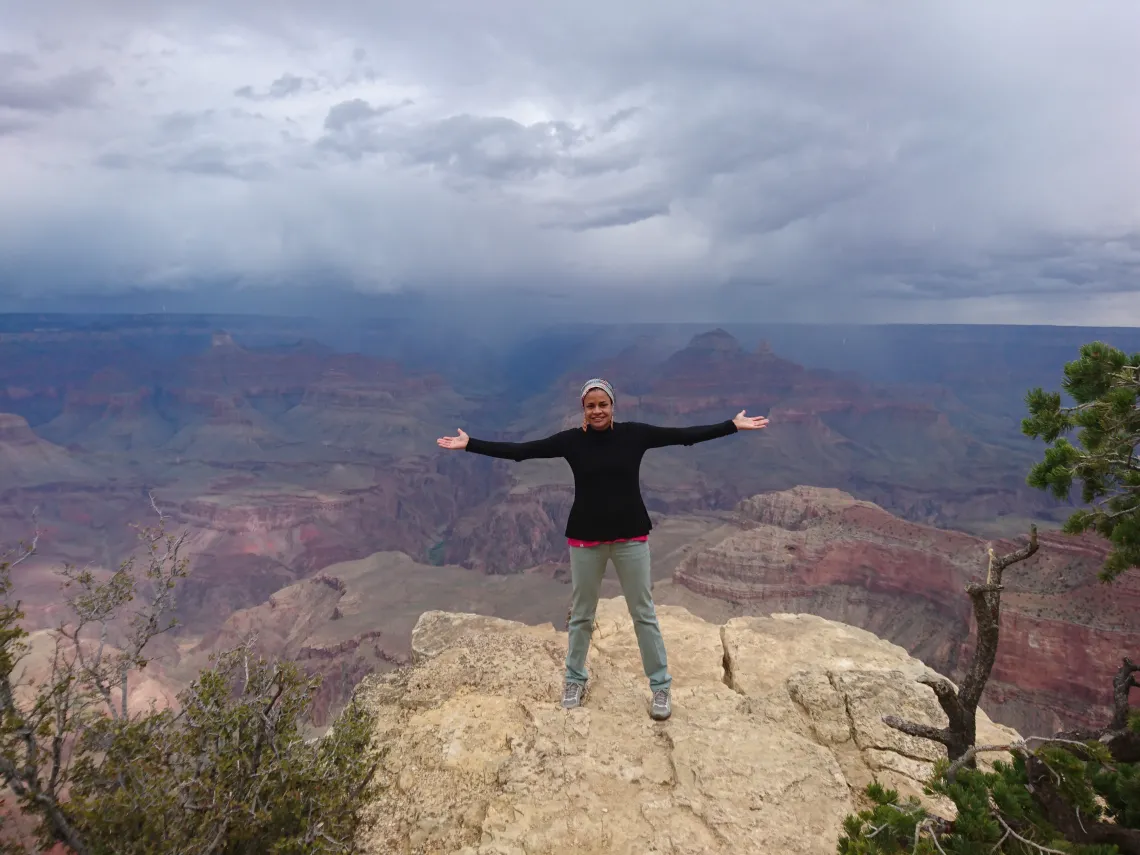Balancing Planet and People: A Fellow’s Holistic Approach to Conservation

By Elizabeth Labiner
For Sonia Delphin-Pérez, pursuing her PhD at the University of Arizona is one more unexpected -- though welcome -- stage in a path marked by unexpected turns. Born in Paraguay to a Haitian father and Paraguayan mother, Delphin-Pérez recalls a very happy childhood, despite the death of her father when she was only three years old. Though she doesn’t remember him clearly herself, she says, her mother and other members of the family spoke about him often and kept him present through shared stories and photographs.
The memory of her father and his environmental work also impacted Delphin-Pérez’s own scholarly and extracurricular pursuits. Early on, she was drawn to architecture and design, but in high school, her interest in nature grew and led her to a major in Forest Engineering at the Universidad Nacional de Asunción. During her undergraduate program, Delphin-Pérez specialized in Remote Sensing, monitoring environmental changes through images from satellites or high-flying aircraft. “At that time, there weren’t many people doing that type of work,” she explains, “so I jumped on the opportunity.”
After graduating, Delphin-Pérez started working for a consultancy firm, where she worked on projects including remote sensing, satellite imaging, and land use planning. After two years with the company, she applied for a position with the World Wildlife Fund (WWF). “When I got the job, it was like a dream come true!” she says. “I just love that organization; I identify strongly with their vision and mission.” Delphin-Pérez worked as a Geographic Informations Systems officer for WWF for three years, while also studying at Kansas State University and Universidad Politécnica de Madrid, before deciding to go to graduate school. She earned her Master of Forest Resources and Conservation at the University of Florida. She explains, “I’m very passionate about natural conservation. I really want to find a balance between meeting people’s needs and conserving forests.”
Delphin-Pérez stayed on at the University of Florida as the Program Coordinator for the Women’s Leadership Program in Paraguay, created in partnership with the U.S. Agency for International Development. “It was a huge change! It was a totally different type of job from my previous work, so I was a little unsure,” she laughs. “But working in a new field, doing program management and implementation, really helped me see more possibilities for myself regarding the types of work I could do in conservation as well.” After several years with the leadership program, Delphin-Pérez learned of an opening in WWF for a program management position. “It ended up being a great transition with my new experience, and something I might not have been able to do otherwise.”
As she continued working on various projects for WWF under the mentorship of WWF-Paraguay Director Lucy Aquino, Delphin-Pérez began considering pursuing a doctoral degree. “While working in the field, I recognized that I had some gaps in my knowledge,” she says. “I really needed to learn more about the social and economic aspects of the work I was doing, because I was only really focused on the environment. I needed to have a more balanced perspective between those three major areas of interest, and so I decided to go back to school.” Delphin-Pérez spoke to her advisor from University of Florida, Dr. Francisco Escobedo, about which programs and degrees might suit her interests. Dr. Escobedo directed her to Dr. José R. Soto, a recent graduate from University of Florida who had joined the faculty at the University of Arizona.
Her Skype call with Dr. Soto went extremely well, she remembers: “I was just so excited to be talking to someone who was doing all the work I was interested in. I was talking and talking about myself and my goals, and I didn’t even realize that it was actually an interview.” The phone call led to Delphin-Pérez being offered a University Fellow award and a three-year assistantship to do her PhD at UA. “I was in shock a little,” she says, “because I didn’t expect to do my PhD right now. I was talking to everyone, thinking I’d do it in two or three more years, but then everything lined up much faster than that. I believe that when the opportunity arises, you have to take it! The right things will come around when they’re supposed to, not necessarily when you expect them to. You have to take advantage of what’s in front of you while it’s there.”
Now, Delphin-Pérez is already making the most of her doctoral program:
My current interest involves finding ways to balance development and conservation of natural resources in developing countries. Therefore, my research focuses on developing a holistic framework for land use planning that includes the environmental, economic and social dimensions of sustainability. I want to demonstrate that if we consider these dimensions, we can reduce conflicts over land uses and improve human well-being and conservation of natural resources in the semi-arid region of Paraguay called Chaco.
She looks forward to creating a greener, more equitably beneficial model for both development and conservation, particularly a model that can be applied not just to Paraguay but to many regions around the world.

